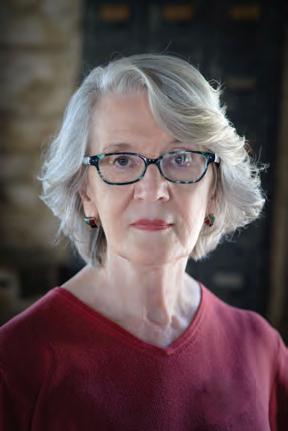
9 minute read
Thursday, October
Aby Dan Aubrey
successful middleaged architect lets himself into a dark New York City apartment, passes through an entry hall faintly scented with a familiar perfume, calls out a woman’s name, and, after moving into the ornately decorated living room, is greeted by the dead body of the young designer with whom he has been having an extramarital affair.
So starts the mystery West Windsor writer Victoria Weisfeld shares with readers in her newly released novel “Architect of Courage.”
“When I started, all I had in my mind was the opening situation,” Weisfeld says during a recent interview at a local café.
However, by the book’s conclusion, that architect, Archer Landis, and the reader have traveled a thenrecently changed post-9/11 world, confronted personal secrets, and become ensnared in a deadly plot.
Up until the current release of this first novel, Weisfeld called herself a short story writer whose works have appeared in mystery anthologies and noted mystery magazines, including Ellery Queen, Sherlock Holmes, and Black Cat.
She is also a member of Sisters of Crime and Mystery Writers of America, reviews New Jersey theater for TheFrontRowCenter.com, and reviews crime/mystery stories for the United Kingdom’s crimefictionlover.com. Her work has also appeared in the U.S. 1 Summer Fiction issue.
While the author spent decades writing for such organization as the National Academy of Science and Robert Wood Johnson Foundation, she says, “Dating back to being a teenager I always wanted to be a fiction writer, but I needed to earn a living.
“When I left the corporate world, I worked freelance for several years. (And) I said I’m not getting younger and I better do it now. So I bit the bullet and started.”
Originally from a small town outside Detroit, she says her interest in fiction comes from her habit of always being a “big reader. I lived in the country, and books were my friend. I liked mystery writers. Nancy Drew came up, she was my hero.”
Drew was followed by Trixie Bell and Hardy Boy mysteries. “Then as you get older, there’s Agatha Christie.”
She says the appeal of mysteries connected to her personal life. “My dad was an engineer. I wanted to know how that works. So, in a mystery you want to know how things work.
“I love puzzles, and a lot of mysteries include a puzzle. ‘The Architect of Courage’ includes two — the code and the puzzle. I didn’t think I was doing it at the time, but, in retrospect, I was putting puzzles in.”
The idea of not thinking is also part of Weisfeld’s process.
“I am a big believer in the subconscious mind,” she says, and categorizes herself as a “pantser” style of writer, as opposed to a plotter.
She sums up the difference as follows, “I write by the seat of my pants, letting the story grow organically, and the relationships deepen as it moves forward. I throw in bits of information — potential clues — as they occur to me and keep those that ultimately fit. Yes, it’s a little messy at times, but I enjoy that thrill of discovery.
“When I get to a place where I can’t easily answer the question, ‘now what?’ I take a big sheet of paper, write the main character’s name in the center, and array all the other characters around, maybe with a few notes about their conflicts or characteristics. Then I draw lines to show how they intersect. Opportunities for new and unexpected connections and points of possible conflict emerge.”
Yet there are some fundamentals that guide her. For example, methods to engage the reader. That includes a murder to heighten the emotion and engage the reader.
She also has a sense of her readers, especially female readers who, she says, “feel threatened a lot of time and they have to be careful. They see things that men don’t notice.”
And as a mystery writer/critic, she says, “I love police procedurals that are really detailed” and appreciates well-rounded characters and seamless plots.
Among her dislikes are the writers — mainly male, she says — whose main characters are the author’s projection of themselves rather than a character with a separate identify and behavior.
“I have to work to not write about me,” she says. “It is a challenge. I throw in a wildcard.”
Speaking about herself, the daughter of a Ford engineer father and elementary school teacher mother says her writing career started with studying journalism at the University of Michigan and then working with a local advertising agency.
That was followed enrolling in graduate classes at the School of Public Health (Pittsburgh) where she met her future husband, Neal, although the two did not start dating until they both came to Washington, DC, during the mid-1970s.
Weisfeld says she started writing for the National Academy of sciences and through the organization met Frank Correll, communications director from the Princeton-based Robert Wood Foundation.
“(He) came down (to Washington) to talk to us, and I thought this was a good connection. I wrote him a letter, but they didn’t have any openings. When they did, that brought us to Princeton.”
In 1983, she and her attorney husband moved to West Windsor, where she raised a family, started writing fiction, and reflects on her first novel.
“Now that the book is out I’m discovering things that my subconscious worked out,” she says about the story she started around the 10th anniversary of the World Trade Center attack.
“Architects are builders and Landis was facing people who were destroyers,” she says. “It is an interesting profession, and it was something that I knew something about, going back to childhood. My father designed our house, my mother and father were Frank Lloyd Wright fans and asked him to design the house. But he declined.”
She says that she had also realized the story would “tie-in” to the anti-Muslim feeling of the time. “When I started this, Muslims were being blamed for everything. I thought that was ridiculous.”
Then there was the theme of West Windsor resident Victoria Weisfeld has published her first novel, a mystery titled ‘Architect of Courage.’
courage. “This is something that I (added) a few drafts in. The story isn’t just a mystery. It was also of Landis’s emotional journey. It has a story arch. He is learning and growing and, while he’s full of regret, he’s coming to terms with what has gone on.”
Weisfeld points out that early in the book, one of Landis’s friends mentions four types of courage: physical, mental, emotional, and moral.
“By the time you get to the end of the book, Archer has displayed each courage in the book. The theme of courage is baked into the DNA of the book,” says Weisfeld.
Architect of Courage, Victoria Weisfeld, 350 pages, $15.99 Black Opal Books



FOUNDATION REPAIR



BASEMENT WATERPROOFING



CONCRETE LIFTING PROVIDING TRUSTED SERVICE SINCE 1997


* Ten percent off any job over $2500 up to a max of $525. Coupon must be presented at time of inspection. Offer may not be combined with any other offer. Limit one per customer. Ask inspector for further details. Promo valid through 10/31/2022
+ Affordable Payment Plans + Nationally-backed
Transferable Warranties
Call for a FREE INSPECTION (215) 584-4709
Area mystery writer Victoria Weisfeld’s new novel, “Architect of Courage,” follows the story of a successful yet personally flawed New York City architect who tackles the mystery of a murder and his own heart.
In the following sample, architect Archer Landis has just discovered that Julia, the young woman with whom he has been having an adulterous affair, has been murdered: BLOOD. BLOOD THAT HAD OOZED from a huge wound in her chest. Blood that drenched the crocheted lace of her shirt and darkened the crimson velvet of the chaise. A stray drop, spattering upward, had left a dot on her chin. He took two halting steps toward her.
Shouldn’t he wipe off that spot? Couldn’t he put all the blood back? Couldn’t he press his hands on her ravaged chest and seal life inside? Her dark eyes, wide open and fixed, gazed blankly toward him and told him he could not.
He stepped backward to sag against the wall and slowly collapsed to the floor. His head drooped. He sobbed into the hands that had held her hands, caressed her face. Hands that should be holding her now. When he raised his head, tears blurred the contours of her pale face, the empty black pools of her eyes. All else washed by a tide of red.
He couldn’t bear to think about the terror of her final moments. What was the last thing she did? What did she see? Who did she see? Who? A dark cloud of vengeance rose in him like smoke from a bonfire. He had to call the police, make them come immediately. Set the hounds of the law on the scent of her killer.
Yet.
Yet he shouldn’t — he couldn’t — be found in her apartment. His presence would damage his reputation and ruin Julia’s. The lie he’d told his wife Marjorie about his evening dinner plans rolled like a boulder through his tumbling thoughts. His associates, his team, the people he spent every day with, considered Julia a colleague, and they’d never trust him again. He wasn’t on easy terms with betrayal — not enough practice. Nor was he clever with lies and excuses. He couldn’t conjure up a plausible reason for being in her apartment when he was so clearly supposed to be elsewhere.
He had to leave, to escape the awful sight of Julia’s body, the awful reality of it. What did I touch? He scanned the room. At one time or another, he’d touched furniture, switches, faucets, dishes, glassware, books, and more. He’d have to explain those fingerprints, eventually.
Evidence of this visit, though, could disappear. If only he’d never come tonight; if only he’d never made this awful discovery. He pulled out a handkerchief and wiped his presence away, scrubbing around the light switch. His back was to her, his eyes were squeezed shut, and still he saw Julia’s broken body.
With a final look at the face he loved, Landis promised her she wouldn’t be alone and in the dark for long and retreated down the hall. He wrapped his hand in the handkerchief, quietly opened the apartment door, wiped the outside knob, and hurried downstairs to the lobby.




